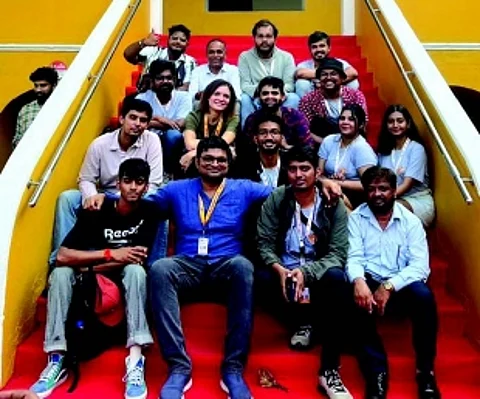

Young Goans are leading the way in not just portraying an image of Goa but also bringing sensitive stories to the fore through their short films. Imagine the brilliance to conceptualise a short film and complete it within 48 hours for a competition. Conceived by National Film Development Corporation of India (NFDC) in partnership with Shorts International, this is the third edition of the 75 Creative Minds of Tomorrow film challenge. Participants including two Goans, Akhil Lotlikar and Kabir Naik, attended workshops and masterclass sessions curated by the masters of world cinema before they embarked on the challenge to make a short film on the theme, ‘Mission Life.’
Telaulim, Navelim-based Akhil Lotlikar is an engineer
graduate from Goa Engineering College, who is currently pursuing a diploma in
film direction from Film and Television Institute of India, Pune. He was in Goa
specifically for the75 Creative Minds of Tomorrow (CMOT) and returned to Pune
soon after the results were declared. He was the director and leader of his
team that created ‘Odh’ which means attachment.
“The concept of our story was that Goa's seashores are
receding because of all the construction and over tourism. Marceline is a
fisherman who is fed up with this. So he decides to drag his boat into the middle
of the city because he doesn't have a parking space on the beach for the boat.
He complains that he wants a parking space here because he doesn't have a
parking space on his own beach,” explains Akhil, who was persuaded to
participate in the competition by Nikhil Shinde.
“This is the first time I've applied for the competition.
Nikhil led me to submit my name for it, which I did at the end of August. We
had to send them our work CD and some projects that we did along with our
biography. There were two rounds of selection and the jury selected the top 75.
The shortlisted participants were announced a few days before the competition.
We were five teams. They divided us into 15 member teams. They selected the
primary HOD's, the director for each of the teams. Rest of the roles in the
teams were divided among us internally. Five scripts were shortlisted and they
give us the script like two days before the competition,’ explains Akhil.
Once the script was in their hands, they had to plan the
time management for the project. “The shooting was for 48 hours within which we
had to develop the script and search for location. They had given us a docket
of locations which are available. Shortlisting the locations is actually going
there for the pre-production. And then in the 48 hours, we had to do the short
division, go to location, shoot, edit to the sound, colour grade the footage
and do the final packaging of the same,” he adds.
The eight minutes short film was shot at Adil Shah Palace in
Panjim and at Siridao Beach. The participants included film enthusiasts from
different states of India who communicated in English and Hindi. IFFI had
managed the participants’ accommodation and travel while Short TV, who was the
producer of these short films, provided them with basic equipment of camera and
sound.
“The entire dynamic of our team was very nice and very
encouraging to work with. They were ready to work for the film and we didn’t
have any ego clashes and the general atmosphere on the set was positive. We
were open to different perspectives,” says Akhil about the team effort.
Akhil has been a movie buff since his school days and even
attended IFFI as a delegate to enjoy the cinema experience. However, this year,
he was only focused on the competition and heading back to his campus to
complete his course. “I joined the course last November and this December, we
will be having the final assessments within a few weeks for the one year
course. We have to make a final diploma film. We have four productions that we
do in the year including a five minute short film, a documentary, a multi
camera production and the final diploma film which is a 15 minute short film,”
says Akhil.
His films include ‘White Flowers,’ a collection of voice
recording of people who eloped and had a lot of backlash for inter-caste and
inter-religion marriages. That was juxtaposed with the different kinds of
phases of a relationship that they went through to create this documentary.
“Mamma mhaka zor aila dista’ (‘Mother, I think I've got fever’) was a multi
camera production, ‘Ropo’ was the first five minute fiction and my final
fiction will be out soon. All were shot in Pune as we have restrictions on the
radius of distance to complete the shoots,” elaborates Akhil.
He was pretty stern on doing something in filmmaking. He
pursued engineering as there were no undergraduate courses in India as such,
which are recognized for filmmaking. Looking towards a brighter and bigger
future, Akhil promises lots more projects in the film industry. “There was a talent
recruitment camp for CMOT at IFFI so Amazon Prime and big production houses had
come to recruit. Communication channels have been set up so hopefully something
fruitful will turn from that. I have plans to do short films as well after my
course,” informs Akhil.
The second prize at the contest was also taken by a Goan-led
team. Kabir Naik’s ‘Ankuran’ is the story of a girl who wants to plant trees in
her struggle against climate change. Kabir from Taleigao is currently based in
Delhi as he is a student of Delhi University. An award winning documentary
filmmaker he directed a documentary film, ‘Khanvte,’ which brings to life a
centuries old man-made built system to use the river waters to cultivate paddy,
harvest fish and even produce salt, the Khazan lands. He is next working on a
new documentary film based on the St Inez Creek for the Charles Correa
Foundation Nagari Film Competition.